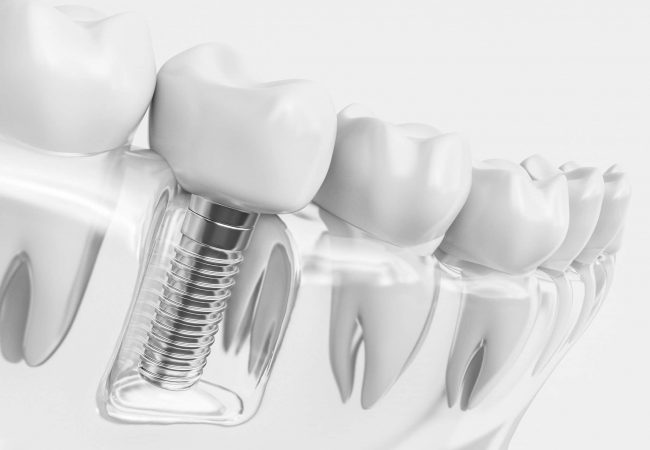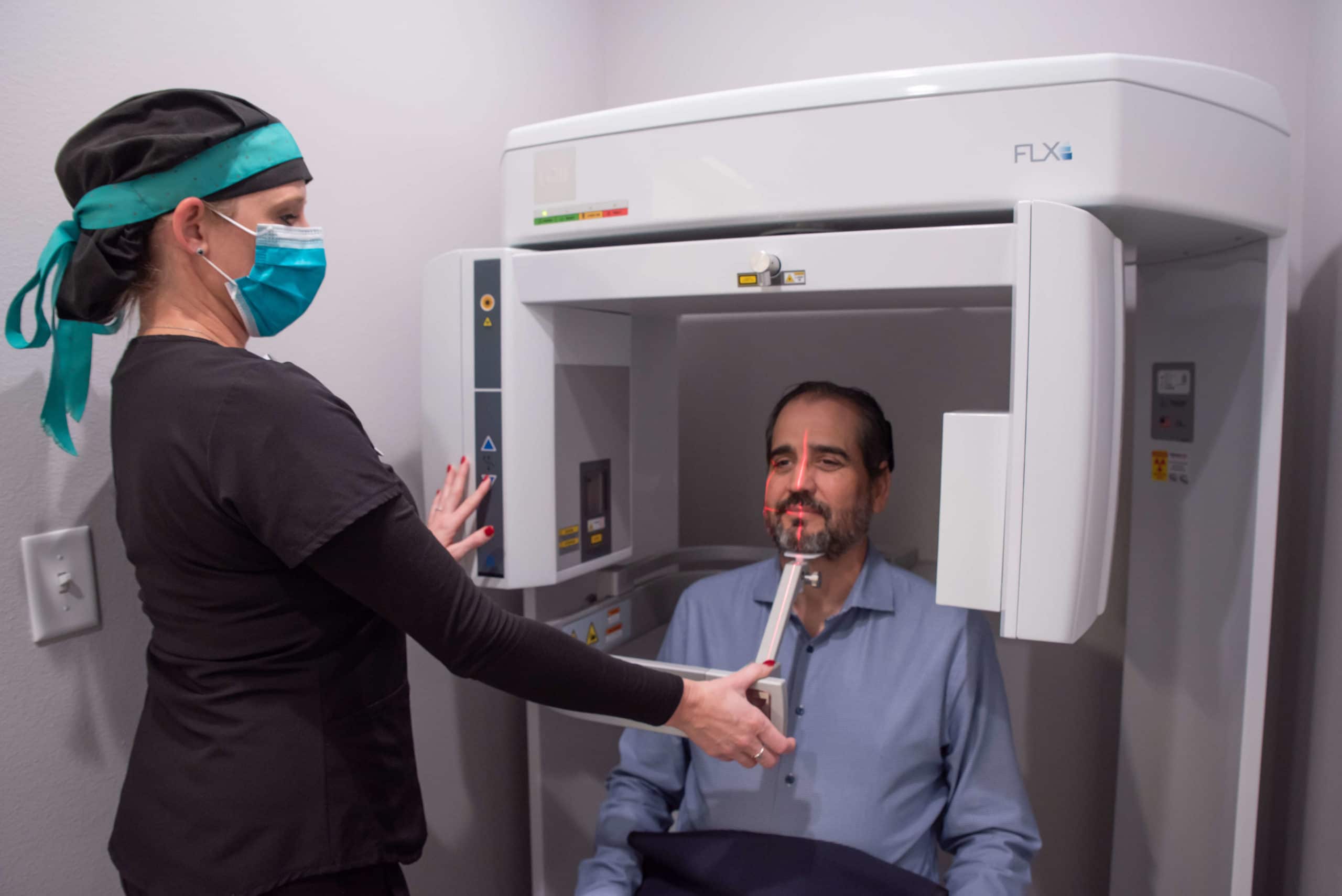Dental Implants FAQ in Wylie, TX
Your Guide To Getting Dental Implants
At North Texas Oral & Facial Surgery, we understand that deciding to undergo dental implant surgery comes with numerous questions and concerns. Our goal is to provide you with all the information you need to feel confident in your decision. Below you’ll find comprehensive answers to common queries about dental implants, designed to reassure and guide you through your smile restoration.
Meet Your Oral Surgeon
Dr. Ajay Ganti is a highly experienced and respected oral surgeon specializing in dental implant procedures. With a commitment to excellence and patient care, Dr. Ganti utilizes the latest techniques and technology to ensure optimal results. His expertise and personalized approach make him a trusted choice for your dental implant needs.
Common Questions & Concerns
What Are the Different Types of Implants?
Dental implants are a versatile and effective solution for replacing missing teeth, designed to blend seamlessly with your natural teeth and restore the full functionality of your mouth. Here's a deeper look into the different types of implants offered and how they cater to various patient needs:
Endosteal Implants
Endosteal implants are the most commonly used type in dental implantology. These implants are surgically placed directly into the jawbone, serving as an artificial root to hold a replacement tooth or bridge. After the implant is placed, a period of healing is required for osseointegration to occur, where the bone integrates with the implant's surface. This type is suitable for patients with a healthy and adequate jawbone density to support the implant. They offer a sturdy, long-lasting solution for tooth replacement, closely mimicking the natural tooth's look and function.
Subperiosteal Implants
Subperiosteal implants are an alternative to endosteal implants, designed primarily for patients who do not have enough healthy jawbone to support traditional implants and do not wish to undergo a bone augmentation procedure to rebuild the bone. Unlike endosteal implants that are placed in the bone, subperiosteal implants rest on top of the jawbone but under the gum. A metal frame is placed under the gum with a post attached to it, and as the gums heal, the frame becomes fixed to the jawbone. Crowns are then attached to the posts protruding from the gums. Subperiosteal implants are less commonly used but can be an effective solution for specific cases.
All-on-4 Implants
All-on-4 implants provide a full-arch restoration using only four implants per jaw. This technique is particularly beneficial for patients who have lost all or most of their teeth and seek a fixed, long-term solution. The implants are strategically placed in areas of the jaw with higher bone density, often allowing for immediate loading of a provisional set of teeth on the same day as the surgery. This approach minimizes the need for bone grafting and reduces recovery time. All-on-4 implants are known for their reliability and the transformative impact they can have on a patient's quality of life, offering a stable and aesthetically pleasing full-mouth restoration.
What Restorations Can I Choose From?
Implants support various restorations, such as:
Single Crowns
Single crowns are used to replace individual missing teeth, making them an ideal choice for patients who have lost one or more teeth due to injury, decay, or other reasons. The crown is custom-made to match the size, shape, and color of the surrounding teeth, ensuring a natural and aesthetically pleasing result. The implant, which acts as the tooth's root, is surgically placed into the jawbone. After the implant has integrated with the bone, a crown is attached to it via an abutment. This option not only restores the visual aspect of the smile but also returns full functionality, allowing patients to eat, speak, and smile with confidence.
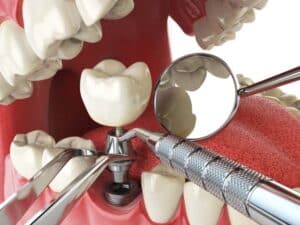
Bridges
When several adjacent teeth are missing, an implant-supported bridge can be an effective solution. Unlike traditional bridges that rely on adjacent natural teeth for support, implant-supported bridges are anchored by implants placed into the jawbone at the sites of the missing teeth. This approach provides a more stable and durable solution that does not put additional strain on remaining natural teeth. Implant-supported bridges are designed to blend seamlessly with natural teeth, restoring aesthetics and function without the need for dentures or extensive dental work.
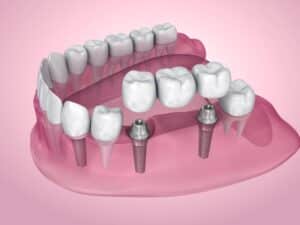
Dentures
For patients missing most or all of their teeth, dentures supported by dental implants provide a significant improvement over traditional removable dentures. Implant-supported dentures can be either fixed or removable, offering a solution that is tailored to the patient's lifestyle and preferences.
Fixed Dentures: Also known as permanent or hybrid dentures, these are securely attached to four or more implants. This option offers the highest level of stability and feels the most like natural teeth. Fixed dentures are designed for patients seeking a durable, long-term solution that doesn't require removal for cleaning.
Removable Dentures: These dentures snap onto implant-supported attachments, providing more stability than traditional dentures without the permanence of fixed dentures. They can be removed for cleaning and maintenance, offering a blend of convenience and improved function.
Both types of implant-supported dentures prevent the bone loss associated with missing teeth and provide superior comfort and chewing efficiency compared to traditional dentures. They are custom-designed to match the natural appearance of the patient's gums and teeth, enhancing facial aesthetics and restoring a full, healthy smile.
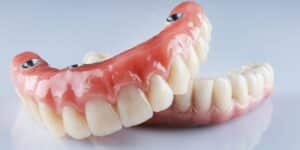
Are Implants Safe?
Yes, dental implants are safe and have been used successfully for decades. They are made from biocompatible materials like titanium, which integrate with the jawbone without causing harm.
What Makes Them a Superior Tooth Replacement Solution?
- Durability: Dental implants are designed to last a lifetime, thanks to the biocompatible materials used, such as titanium, which fuse with the jawbone in a process known as osseointegration. This strong bond not only ensures the implant remains secure but also helps to maintain the implant's structure over decades with proper care, distinguishing them from other tooth replacement options that may need regular replacements or adjustments.
- Functionality: Implants restore nearly 100% of a person's chewing function, allowing patients to enjoy a wide range of foods without the limitations often experienced with dentures. They also improve speech clarity, which can be affected by the movement of removable prostheses. The stability of implants can enhance a person's confidence in social situations, knowing their prosthetic teeth won't slip or cause speech impediments.
- Aesthetics: Dental implants provide the most natural-looking solution for missing teeth. Custom-crafted crowns are made to match the color, shape, and size of surrounding teeth, blending seamlessly with the rest of the patient's smile. This attention to detail ensures that implants enhance the overall appearance, often making it impossible to tell the difference between natural teeth and prosthetic replacements.
- Bone Preservation: One of the most significant advantages of dental implants is their ability to preserve and stimulate natural bone growth. When a tooth is lost, the jawbone in the area can begin to deteriorate over time due to lack of stimulation. Implants mimic the root of a natural tooth, stimulating the bone and preventing the atrophy that often accompanies tooth loss.
Can Patients with Gum Disease Get Implants?
Successful dental implantation relies on the health of the gums and surrounding tissues. For patients with gum disease, treatment and management of the condition are essential before proceeding with implants. This may involve deep cleaning procedures, medication, or even surgery to ensure the gums are healthy enough to support the implants. Once gum health is restored, patients can often proceed with implant surgery, highlighting the importance of oral hygiene and professional care in the success of dental implants.
Can Diabetic Patients Get Tooth Implants?
While diabetes poses challenges for any surgical procedure due to potential complications with wound healing and infection, well-controlled diabetes does not automatically disqualify a patient from receiving dental implants. Rigorous pre-surgical planning and post-operative care are crucial for diabetic patients. Blood sugar levels must be closely monitored before and after the procedure to ensure they remain within a safe range, reducing the risk of complications. With careful management, diabetic patients can successfully receive dental implants, enjoying the benefits they offer.
Are Dental Implants Safe for Seniors?
Dental implants are a safe and effective solution for patients of all ages, including seniors. Age itself is not a contraindication for dental implant surgery. Many older adults are excellent candidates for implants, as they can significantly improve quality of life by enhancing nutritional intake, social interaction, and overall self-esteem. Preoperative assessments focus on evaluating the patient's general health, oral health, and bone density rather than age, ensuring that seniors can safely benefit from dental implants.
Do I Need to Follow a Special Diet?
Immediately after implant surgery, a soft diet is recommended to protect the surgical site and ensure proper healing. Patients are advised to avoid hard, crunchy, or sticky foods that could dislodge the implant or damage the prosthetic. As the site heals and the implant integrates with the jawbone, patients can gradually return to their normal diet. Long-term, there are no dietary restrictions with dental implants, allowing patients to enjoy their favorite foods with confidence. Your oral surgeon in Wylie, TX, will give you specific dietary recommendations and instructions.
How Long Does Recovery Take?
The initial healing phase following implant surgery typically lasts a few days to a week, during which patients may experience some swelling, bruising, and discomfort, manageable with prescribed or over-the-counter pain relievers. The complete integration of the implant into the bone, a process known as osseointegration, can take several months. During this time, patients may wear a temporary restoration until the final prosthesis is placed.
Will I Need to Avoid Certain Activities or Hobbies?
In the immediate post-operative period, patients are advised to avoid strenuous physical activities that could increase blood pressure and cause bleeding at the implant site. This includes heavy lifting, vigorous exercise, and any activities that might impact the face or jaw. Once healed, patients can resume their usual activities without restrictions, as dental implants are designed to function like natural teeth.
How Do I Keep My Dental Implants in Good Condition for Life?
Maintaining dental implants involves routine oral hygiene practices, such as brushing twice a day, flossing daily, and using an antimicrobial mouthwash to prevent infection around the implant site. Regular dental check-ups and cleanings are crucial for monitoring the health of the implants and the surrounding tissues. Avoiding habits that can damage the implants, such as smoking or chewing on hard objects, also contributes to their longevity. With proper care, dental implants can last a lifetime, providing a permanent solution for missing teeth.
